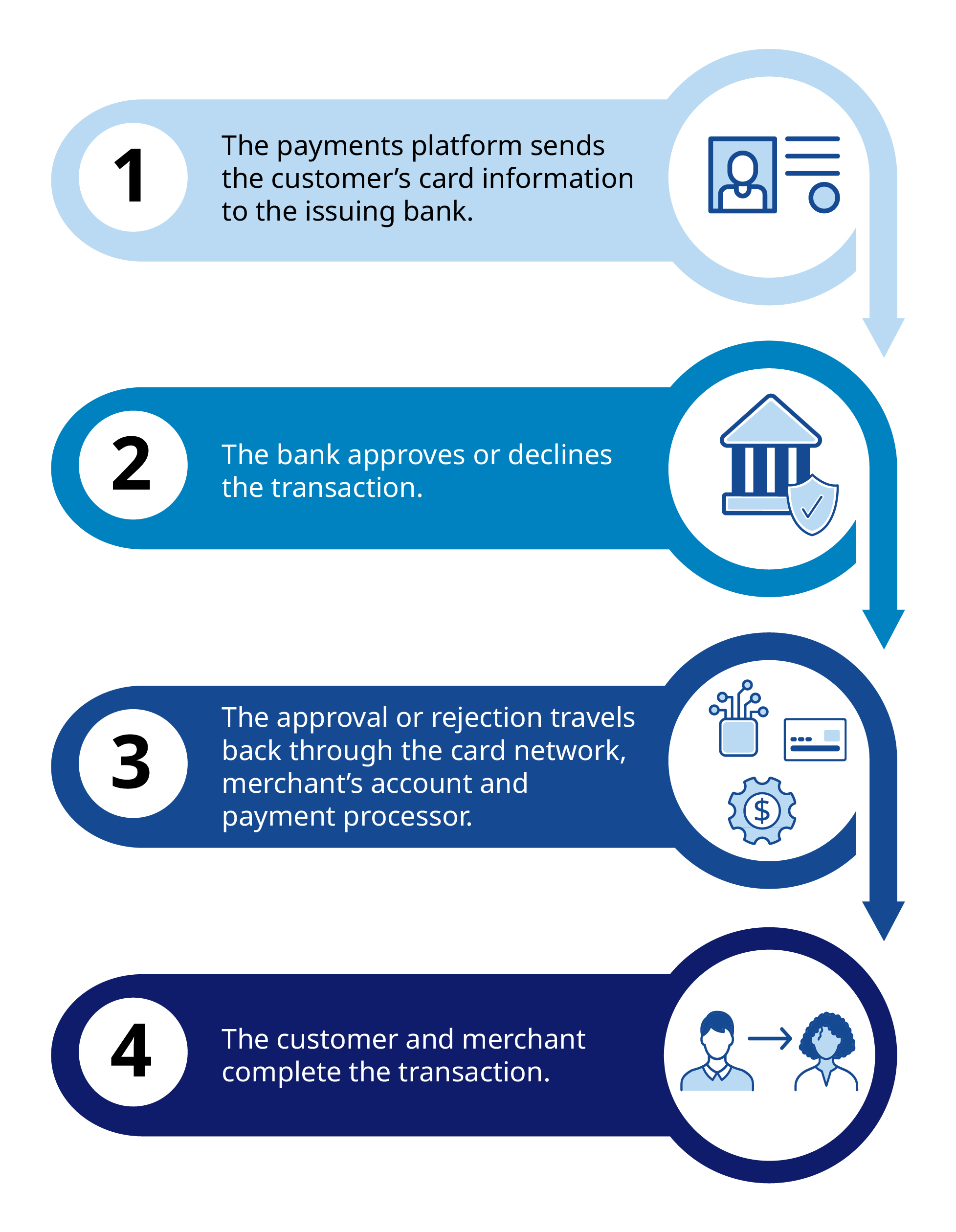What to Do During a Card Processing Outage at Your Business
Whether you run an online store or a brick-and-mortar business, you depend on non-cash revenue. Debit and credit cards have become Americans’ preferred payment method, with an estimated 69% of us using cash for “few (if any) purchases” in the last year, according to research from CapitalOne.
So what happens when you experience a card processing outage or your system goes down? You can’t accept card payments, and your customers can’t pay. It’s an unfortunate situation, but card outages happen. Here’s what you can do if your card readers go down to reduce the financial and reputational impact on your business.
You’re Down, But Not Out
Most payment card transactions happen instantly. From the customer viewpoint, it’s just seconds from the time they tap or swipe their card until they get an acceptance message. Anything longer than a few seconds can frustrate customers. And while the transaction appears fast and smooth to the buyer, a lot is going on behind the scenes during those few moment.

When credit card machines are down or there’s a credit card outage, that usually seamless process can’t happen. An outage can stem from several sources.
- The merchant’s equipment could be to blame.
- The Wi-Fi router might be acting up, making it difficult to connect to the internet. Refreshing your router or switching to a wired connection may clear up the issue.
- The credit card processor itself is down. A Visa debit card outage may happen when Visa’s having connectivity issues, for example.
- The software a business uses to process card payments may be experiencing a glitch or outage.
An outage, no matter its cause, can disrupt your business and lead to a drop in customer satisfaction.
How Does a Card Outage Affect Your Business?
Because card outages can have a tangible impact on your company, you should do what you can to make these issues as rare as possible. Some negative effects can include:
- Loss of business: A credit card outage can cause an immediate loss of business. The customers who planned on paying with their debit or credit card are stuck. If you operate a physical store, some of those customers can switch to cash payments. If your sales are primarily online, your customers most likely can’t complete their purchases until the outage is resolved. You may notice a dip in sales on the day of the outage.
- Unhappy customers: Cards offer convenience and security that cash can’t match, and many shoppers primarily carry cards because of that safety. If someone loses a debit or credit card, they can report the loss to their bank, pause and cancel the card so they don’t have to worry about losing actual money. If someone drops $20 on the street, that money is gone for good. When customers can’t use their preferred payment methods, they might take their business elsewhere.
- Negative reputation: Frequent outages can adversely affect your business’s reputation. Customers may start to assume that your card machines won’t be working and may be more likely to visit your competitors. Faulty payment card equipment can also cause customers to question your business’s trustworthiness.
What Causes Card Outages?
Card outages can happen for a few reasons. Some issues are widespread and may affect multiple merchants and businesses simultaneously, while others occur only with your business.
- Power outage: During a power outage, everything will be down. Your business’s point-of-sale (POS) system may not operate, and your computers won’t power on. If your customers are shopping online, they may get cut off from shopping if their own power goes out. First contact your electric company. Inform them of the outage so they can send out a crew to investigate and fix the issue. The electric company can also give you an estimate of when you can expect them to restore power. Some brick-and-mortar stores choose to add generators and backup power to their premises to keep their POS systems running if the power does go off.
- Internet issues: Card payment processing needs an internet connection to work. If the connection gets interrupted, the payment can’t go through. Internet issues can take multiple forms and have different sources, such as a weak or blocked Wi-Fi signal. Also, check to ensure your router is functioning properly. Sometimes, moving the router or switching to a wired connection is all you need to do to solve the problem.
- Provider outage: An outage may stem from the provider. Storms and severe weather may affect your internet service provider’s ability to establish a connection. Many service providers have outage maps online and keep their customers in the loop if there’s an issue in the area. In this case, all you can do is wait for the connection to be restored.
- Hardware troubles: The hardware you use to process sales and read payment cards may have issues, which can look like a credit card outage. For example, the card reader may wear out or become unable to detect contactless payments. If the hardware isn’t updated, it can also stop working. Sometimes, the ports that connect your register to the card reader can become worn out. In that case, you may need to replace your hardware to get your system up and running again.
- Software issues: In rare cases, the payment processor’s software may cause a card outage. If the payment processor goes down, your business and numerous others will be affected. It can also be the case that one of the major card companies, such as Visa or Mastercard, is experiencing an outage.
What to Do During a Credit Card Outage
During a card outage, you don’t have to wait for the issue to be resolved. Being proactive can help protect your reputation, get to the root of the issue and keep your customers happy.
Take these steps if your credit card system is down:
- Tell your customers: As soon as you detect a problem, tell your customers about it. Email people to inform them of the issue, put a message on your website or social media and post a sign on the door of your physical location. Explain what’s happening and how you’re working to fix it.
- Accept other forms of payment: The more payment options customers have, the more likely they are to complete their purchase. If you can’t accept credit or debit cards now, let people know which payment methods are working, whether it’s cash, e-Checks or alternative payment options like PayPal or Venmo.
- Troubleshoot: Try to find the source of the problem. It could be something you can fix on your own. Fix Wi-Fi issues by restarting the router or look for loose cables in your POS system. Check for updates on your software and hardware, as well.
- Ask around: If you can’t find an immediately obvious source of the problem, find out if other businesses are experiencing the same issue. Once you know the problem is bigger than your company, you can monitor the situation and inform the parties who are most likely going to resolve it.
- Offer a discount: Your customers may be inconvenienced during a card outage. One way to smooth over the situation and encourage them to shop with you again is to offer a discount code or coupon to use on a future purchase.
- Take steps to prevent credit card outages in the future: Being proactive can help reduce the chance of a credit card outage in the future. Purchasing a backup generator, switching internet providers and preparing for bad weather are helpful steps to take.
Another option is to address the issue before an outage occurs. You can do this by keeping your hardware and software up to date to reduce the chance of malfunctions. It’s also worthwhile to find a payment platform with a proven track record and stellar reputation.
Choose CSG Forte as Your Payment Platform
You need to have a payment platform that will have your back during a card outage and that will provide the flexibility you need to respond to any outage issues. CSG Forte has decades of experience as a complete payment solution. We’ll help you accept all payments and keep your business online. Contact us today to get started.

